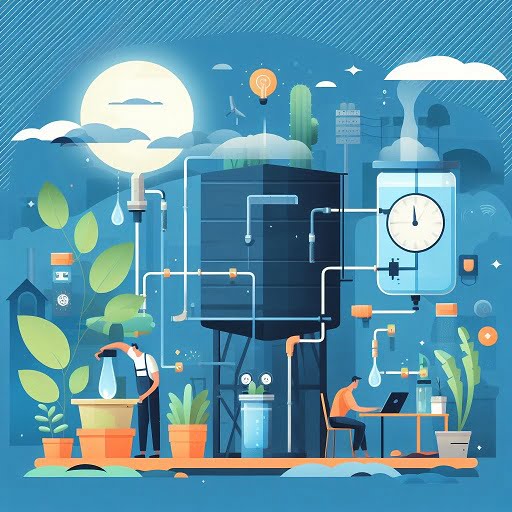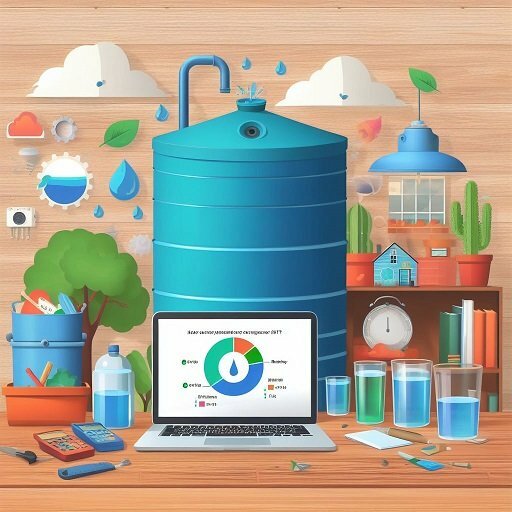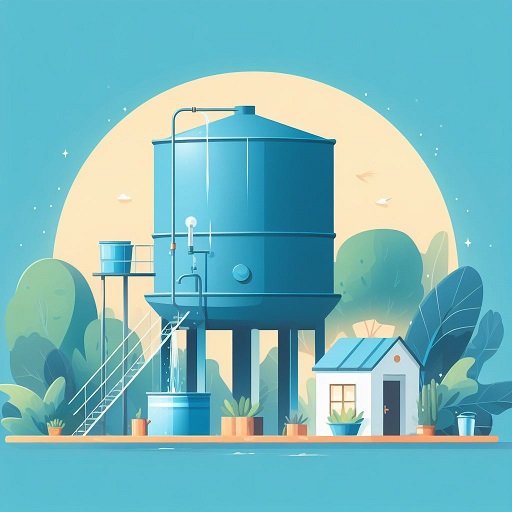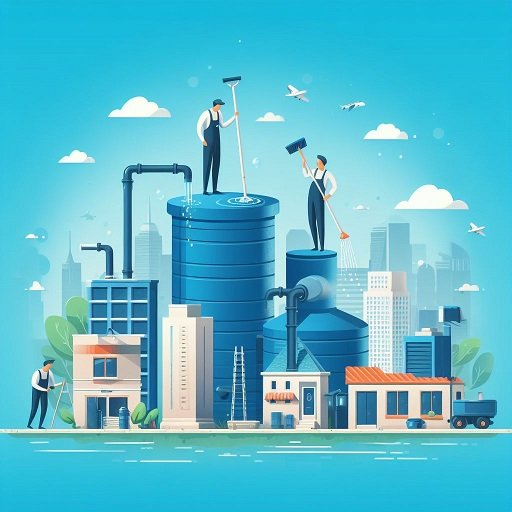Water is essential for life, but it can also be a source of disease and discomfort if it is not clean and safe. Water tanks are commonly used in Karachi to store water for domestic and commercial purposes, but they need regular cleaning and maintenance to ensure their quality and hygiene. In this article, we will discuss the importance of water tank cleaning, the signs that indicate your water tank needs cleaning, the best time for water tank cleaning in Karachi, and the benefits of timely cleaning.
We will also compare DIY vs. professional cleaning, provide a step-by-step guide on how to clean your water tank, and share some maintenance tips for a cleaner water tank. Finally, we will conclude with a recap of the main points and some additional resources for further information.
From Health to Environment: The Far-reaching Impacts of Water Tank Cleanliness in Karachi
Water tanks are an important part of the water supply system in Karachi, where the municipal water supply is often unreliable, insufficient, or contaminated. Many households and businesses rely on water tanks to store water for their daily needs, such as drinking, cooking, washing, and cleaning. However, water tanks can also become a breeding ground for bacteria, algae, fungi, and other microorganisms that can cause various health problems, such as diarrhea, typhoid, cholera, hepatitis, skin infections, and more. Therefore, it is essential to keep your water tank clean and sanitized to prevent the spread of waterborne diseases and ensure the quality of your water.
The impact of water tank cleanliness on health is not only limited to the users of the water but also to the environment and society at large. Dirty water tanks can pollute the groundwater and the surrounding areas, leading to environmental degradation and ecological imbalance. Moreover, dirty water tanks can increase the burden on the health care system and the economy, as more people fall sick and lose productivity due to water-related illnesses. Hence, water tank cleaning is not only a personal responsibility but also a social and environmental duty.
Why Cleaning Your Water Tank Matters
As we have seen in the previous section, water tank cleaning is important for various reasons. Here are some of the main benefits of keeping your water tank clean:
- Health benefits: Cleaning your water tank regularly can reduce the risk of contracting waterborne diseases and improve your overall health and well-being. Clean water can also boost your immunity, digestion, metabolism, and skin health.
- Extended tank lifespan: Cleaning your water tank regularly can prevent corrosion, rusting, cracking, and leakage of your tank. This can extend the lifespan of your tank and save you money on repairs or replacements.
- Improved water quality: Cleaning your water tank regularly can improve the taste, odor, color, and clarity of your water. This can enhance your satisfaction and comfort when using your water for various purposes.
- Cost savings: Cleaning your water tank regularly can save you money on water bills, medical bills, and maintenance costs. By keeping your water tank clean, you can reduce the amount of water wasted due to poor quality or contamination. You can also avoid spending money on treating water-related illnesses or fixing damaged tanks.
Signs Your Water Tank Needs Cleaning
How do you know if your water tank needs cleaning? There are some signs that you can look out for that indicate that your water tank is dirty or contaminated. Here are some of the common signs that your water tank needs cleaning:
- Changes in water color or odor: If you notice that your water has a different color or smell than usual, it could be a sign that your water tank is dirty or contaminated. For example, if your water has a brownish or yellowish tint or a musty or rotten smell, it could mean that there is rust or sediment in your tank or that there are bacteria or algae growing in your tank.
- Visible sediment or debris: If you see particles or dirt floating in your water or settling at the bottom of your tank, it could be a sign that your water tank is dirty or contaminated. These could be dust, sand, soil, leaves, insects, animal droppings, or other foreign materials that have entered your tank through cracks or openings.
- Decreased water pressure: If you experience low or inconsistent water pressure when using your taps or showers, it could be a sign that your water tank is dirty or contaminated. This could be due to clogging or blockage of pipes or valves by sediment or debris in your tank.
- Unexplained illnesses: If you or anyone in your household suffers from unexplained illnesses such as fever, nausea, vomiting, diarrhea, stomach cramps, headache, fatigue, or skin rashes, it could be a sign that your water tank is dirty or contaminated. These could be symptoms of waterborne diseases caused by bacteria, viruses, parasites, or chemicals in your water.
If you notice any of these signs, you should take immediate action and clean your water tank as soon as possible. You should also consult a doctor if you have any health concerns or complaints.
The Best Time for Water Tank Cleaning
Now that you know why and when your water tank needs cleaning, the next question is: when is the best time to clean your water tank? The answer depends on several factors, such as the season, the frequency, and the factors affecting your cleaning schedule. Let us look at each of these factors in detail.
Seasonal considerations
The season can affect the quality and quantity of your water supply, as well as the growth and activity of microorganisms in your water tank. Therefore, you should consider the seasonal variations when planning your water tank cleaning schedule. Here are some general guidelines for each season:
- Summer: Summer is the hottest and driest season in Karachi, with temperatures ranging from 30°C to 44°C. This means that the water demand is high and the water supply is low. Moreover, the high temperature and humidity can promote the growth and reproduction of bacteria, algae, and fungi in your water tank. Therefore, summer is the most critical time to clean your water tank, as it can prevent water shortages, contamination, and diseases. You should clean your water tank at least once before the start of summer and once during the peak of summer.
- Monsoon: Monsoon is the wettest and most unpredictable season in Karachi, with rainfall ranging from 85 mm to 130 mm. This means that the water supply is high and the water quality is low. Moreover, rainwater can carry pollutants, dirt, and debris into your water tank through cracks or openings. Therefore, monsoon is another important time to clean your water tank, as it can prevent water pollution and damage. You should clean your water tank at least once before the start of the monsoon and once after the end of the monsoon.
- Winter: Winter is the coolest and most pleasant season in Karachi, with temperatures ranging from 10°C to 25°C. This means that the water demand is low and the water supply is moderate. Moreover, the low temperature and humidity can inhibit the growth and activity of bacteria, algae, and fungi in your water tank. Therefore, winter is the least urgent time to clean your water tank, as it poses less risk of water problems. However, you should still clean your water tank at least once during winter to maintain its hygiene and efficiency.
Frequency of cleaning
The frequency of cleaning your water tank depends on how often you use your water and how dirty it gets. Generally speaking, you should clean your water tank at least once every six months to ensure its optimal performance and safety. However, this may vary depending on your specific situation and needs. For example, if you use a lot of water or have a large family, you may need to clean your water tank more often than someone who uses less water or lives alone. Similarly, if you have a poor quality or unreliable water source, such as borehole or tanker water, you may need to clean your water tank more often than someone who has a good quality or reliable water source, such as municipal or filtered water.
To determine the best frequency for cleaning your water tank, you should monitor your water usage and quality regularly and adjust your cleaning schedule accordingly. You should also follow the seasonal guidelines mentioned above and clean your water tank before or after each season change.
Factors affecting cleaning schedules
Apart from the season and the frequency, there are other factors that can affect your cleaning schedule for your water tank. These include:
- Tank size: The size of your tank can affect how quickly it gets dirty or contaminated. Larger tanks can hold more water and sediment than smaller tanks. Therefore, larger tanks may need less frequent cleaning than smaller tanks. However, larger tanks may also require more time and effort to clean than smaller tanks.
- Water source: The source of your water can affect its quality and quantity. Different sources of water may have different levels of contaminants or additives that can affect your water tank. For example, borehole or tanker water may have more dirt or minerals than municipal or filtered water. Therefore, you may need to clean your water tank more often if you use borehole or tanker water than if you use municipal or filtered water.
- Usage patterns: The way you use your water can affect how dirty it gets or how much it wastes. Different uses of water may have different impacts on your water tank. For example, drinking or cooking water may require higher standards of cleanliness than washing or cleaning water. Therefore, you may need to clean your water tank more often.
Benefits of Cleaning Your Water Tank Timely
As we have seen in the previous sections, cleaning your water tank timely can have many benefits for your health, your tank, your water, and your wallet. Here are some of the main benefits of cleaning your water tank timely:
- Health benefits: Cleaning your water tank at a time can prevent the growth and spread of harmful microorganisms that can cause waterborne diseases. By cleaning your water tank timely, you can ensure that your water is safe and hygienic for drinking, cooking, washing, and cleaning. This can improve your overall health and well-being, as well as prevent illnesses and infections that can affect your quality of life.
- Extended tank lifespan: Cleaning your water tank timely can prevent the accumulation of sediment, debris, rust, and corrosion that can damage your tank. By cleaning your water tank timely, you can remove these impurities and protect your tank from cracks, leaks, and breaks. This can extend the lifespan of your tank and save you money on repairs or replacements.
- Improved water quality: Cleaning your water tank timely can improve the taste, odor, color, and clarity of your water. By cleaning your water tank timely, you can remove any contaminants or additives that can affect your water quality. This can enhance your satisfaction and comfort when using your water for various purposes, as well as reduce the need for additional filtering or boiling.
- Cost savings: Cleaning your water tank in time can save you money on water bills, medical bills, and maintenance costs. By cleaning your water tank timely, you can reduce the amount of water wasted due to poor quality or contamination. You can also avoid spending money on treating water-related illnesses or fixing damaged tanks.
By cleaning your water tank timely, you can enjoy these benefits and more. You can also avoid the risks and costs associated with dirty or contaminated water tanks. Therefore, it is advisable to clean your water tank timely and regularly to ensure its optimal performance and safety.
DIY vs. Professional Cleaning
Another question that you may have is: should you clean your water tank yourself or hire a professional service? The answer depends on your preference, budget, and skill level. Here are some of the pros and cons of DIY vs. professional cleaning:
DIY cleaning:
DIY cleaning means that you clean your water tank yourself, using your own tools and products. Some of the advantages of DIY cleaning are:
- You can save money on labor costs and service fees.
- You can choose the products and methods that suit your needs and preferences.
- You can have more control and flexibility over the cleaning process and schedule.
- You can learn new skills and gain satisfaction from doing it yourself.
However, some of the disadvantages of DIY cleaning are:
- You may need to invest in tools and products that you may not use frequently or regularly.
- You may need to spend more time and effort than a professional service.
- You may not have the expertise or experience to clean your water tank properly or safely.
- You may expose yourself to health hazards or injuries from handling chemicals or climbing ladders.
Professional cleaning:
Professional cleaning means that you hire a professional service to clean your water tank for you, using their tools and products. Some of the advantages of professional cleaning are:
- You can save time and energy by letting someone else do the work for you.
- You can rely on the expertise and experience of trained and qualified cleaners.
- You can ensure that your water tank is cleaned thoroughly and safely, using the best practices and standards.
- You can avoid health hazards or injuries from handling chemicals or climbing ladders.
However, some of the disadvantages of professional cleaning are:
- You may need to pay more money for labor costs and service fees.
- You may need to compromise on the products and methods that are used by the service provider.
- You may have less control and flexibility over the cleaning process and schedule.
- You may have to deal with unreliable or unprofessional service providers.
To decide whether to go for DIY or professional cleaning, you should consider the following factors:
- Cost comparison: Compare the costs of DIY vs. professional cleaning, including the tools, products, labor, service, and maintenance costs. Choose the option that fits your budget and offers the best value for money.
- Skill level: Assess your skill level and confidence in cleaning your water tank yourself. Choose the option that matches your ability and comfort level.
- Tank condition: Evaluate the condition of your water tank and the level of dirtiness or contamination. Choose the option that can handle the complexity and difficulty of your water tank cleaning task.
There is no definitive answer to whether DIY or professional cleaning is better for your water tank. It depends on your personal situation and preference. However, whichever option you choose, make sure that you follow the proper steps and precautions to clean your water tank effectively and safely.
How to Clean Your Water Tank
Whether you choose to clean your water tank yourself or hire a professional service, you should follow a step-by-step cleaning process to ensure that your water tank is cleaned effectively and safely. Here are the basic steps for cleaning your water tank:
- Step 1: Draining the tank. The first step is to drain the water from your tank completely. You can use a pump, a hose, or a bucket to empty your tank. You should also turn off the water supply to your tank and disconnect any pipes or valves that are connected to your tank. You should dispose of the drained water properly and avoid using it for any purpose.
- Step 2: Removing sediment and debris. The second step is to remove any sediment or debris that have accumulated at the bottom or the sides of your tank. You can use a broom, a brush, a scraper, or a vacuum cleaner to loosen and collect the dirt from your tank. You should also inspect your tank for any cracks, leaks, or damage and repair them if necessary.
- Step 3: Sanitizing the tank. The third step is to sanitize your tank to kill any bacteria, algae, fungi, or other microorganisms that may be present in your tank. You can use a bleach solution, a chlorine solution, or a commercial disinfectant to sanitize your tank. You should follow the instructions and precautions on the product label and wear protective gloves, goggles, and masks when handling chemicals. You should also rinse your tank thoroughly with clean water after sanitizing it.
- Step 4: Refill the tank. The final step is to refill your tank with clean water. You should use a filter system, a purifier, or a boiling method to ensure that your water is safe and hygienic for use. You should also check the water pressure and quality before using your water for various purposes.
By following these steps, you can clean your water tank effectively and safely. However, you should also keep in mind some tips and best practices for cleaning your water tank, which we will discuss in the next section.
Maintenance Tips for a Cleaner Water Tank
Cleaning your water tank is not a one-time task, but a continuous process that requires regular maintenance and care. To keep your water tank cleaner for longer, you should follow some preventive measures and best practices that can reduce the dirtiness or contamination of your water tank. Here are some of the maintenance tips for a cleaner water tank:
- Preventive measures: One of the best ways to keep your water tank clean is to prevent dirt and debris from entering your tank in the first place. You can do this by:
- Installing a filter system: A filter system can remove impurities and contaminants from your water source before they reach your tank. You can choose from different types of filters, such as sediment filters, carbon filters, reverse osmosis filters, or ultraviolet filters, depending on your water quality and needs. You should also clean and replace your filters regularly to ensure their effectiveness.
- Regular inspections: You should inspect your water tank, pipes, valves, and fittings regularly for any signs of damage, leakage, or blockage. You should also check the water level, pressure, and quality regularly to detect any problems or changes. If you find any issues, you should fix them as soon as possible to prevent further damage or contamination.
- Keeping a maintenance schedule: Another way to keep your water tank clean is to follow a maintenance schedule that reminds you when to clean your water tank. You can use a calendar, a planner, an app, or a reminder service to keep track of your cleaning schedule. You should also follow the seasonal guidelines and the frequency factors that we discussed in the previous sections to determine the best time for cleaning your water tank.
- Importance of documentation: Finally, one of the most important tips for keeping your water tank clean is to document your cleaning process and results. You should keep a record of when, how, and by whom your water tank was cleaned, as well as any issues or improvements that were observed. This can help you monitor your water tank condition and performance over time and identify any patterns or trends that can inform your future cleaning decisions.
By following these maintenance tips, you can keep your water tank cleaner for longer and enjoy the benefits of clean water for a healthy life.
Conclusion
In this article, we have discussed the best time to clean your water tank in Karachi. We have learned about the importance of water tank cleaning, the signs that indicate your water tank needs cleaning, the best time for water tank cleaning in Karachi, and the benefits of timely cleaning. We have also compared DIY vs. professional cleaning, provided a step-by-step guide on how to clean your water tank, and shared some maintenance tips for a cleaner water tank.
We hope that this article has been informative and helpful to you. We encourage you to take action and clean your water tank timely and regularly to ensure its optimal performance and safety. Remember that clean water is essential for a healthy life.




